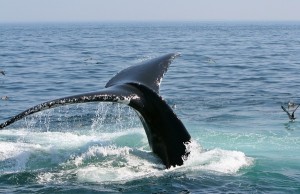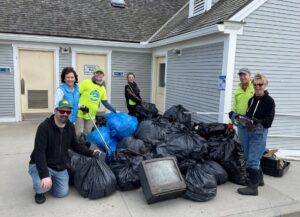 BARNSTABLE – Based on a request from the Massachusetts Division of Marine Fisheries, and with support from the Atlantic Large Whale Take Reduction Team, the National Oceanic and Atmospheric Administration (NOAA) Fisheries is proposing to make additional changes to its Atlantic Large Whale Take Reduction Plan to help reduce large whale serious injuries and deaths due to entanglement in fishing gear.
BARNSTABLE – Based on a request from the Massachusetts Division of Marine Fisheries, and with support from the Atlantic Large Whale Take Reduction Team, the National Oceanic and Atmospheric Administration (NOAA) Fisheries is proposing to make additional changes to its Atlantic Large Whale Take Reduction Plan to help reduce large whale serious injuries and deaths due to entanglement in fishing gear.
The Atlantic Large Whale Take Reduction Team includes fishermen, state and federal resource managers, scientists, and gear specialists.
The Division of Marine Fisheries requested that NOAA delay by one month the start date for a fishery closure in Massachusetts Bay, and extend the size of the closure area.
The delay would move the start date to February 1 from January 1.
The Division of Marine Fisheries also requested an exemption for fishermen from the current minimum number of traps per trawl requirement, which takes effect June 1.
The exemption would be for portions of Southern New England waters–Buzzards Bay, Vineyard Sound, and Nantucket Sound–as well as state waters north and east of Cape Cod.
This exemption would enable small-vessel fishermen to continue to fish fewer traps for safety reasons.
Because the January Massachusetts Bay closure is imminent, and the analysis needed for the other state request will take more time to complete, NOAA officials say they decided to consider the closure request first.
NOAA is seeking public comment on this request through November 21.
“After consulting with our Take Reduction Team, we determined that modifying the closure area start date and extending the size of the closure area would provide virtually the same conservation benefit as the planned closure but with less adverse economic impact on the commercial fishing industry,” said John Bullard, regional administrator, NOAA Fisheries. “We are always open to good ideas. The state came to us with a good proposal that was a win-win for everybody, so we are moving forward with making these plan changes.”
NOAA is also proposing through this action to shift the current time frame that lobster fishermen are required to remove their fishing gear from federal waters surrounding the Outer Cape Cod area, from the period January 16–March 15 to February 1–March 30.
This would align the new start date of the proposed Atlantic Large Whale Take Reduction Plan closure in Massachusetts Bay with these existing lobster management measures. It also would ensure consistency between federal and state regulations, according to NOAA.
According to Dave Gouveia, marine mammal and sea turtle program coordinator, “If whale protection measures are to be effective, they need the support of fishermen and the environmental community. The input we received during 16 outreach meetings from Maine through Florida, over the course of several months, helped us craft the plan revisions that we implemented in June. Similarly, the changes now proposed are intended to address concerns raised by Massachusetts fishermen.”
The measures approved in June included a reduction in the amount of fishing gear in portions of federal and state waters, time/area closures to reduce interactions between fisheries and whales in areas where concentrations of whales and gear were highest, and an expanded gear marking scheme to make it easier to identify gear when whales get entangled.
NOAA officials say they expect to discuss the Commonwealth’s other request, pertaining to the minimum number of traps per trawl requirement, with the Take Reduction Team during their January meeting.
Under the Marine Mammal Protection Act, the number of deaths or serious injuries due to commercial fishing activities must not affect a species’ ability to reach or maintain its optimum sustainable population. At present, the number of serious injuries and mortalities for right whales and humpback whales is too high, according to NOAA officials.
“We expect the closure to reduce the risk of vertical line entanglements in areas and times where known abundance of large whales has overlapped with areas of high trap/pot gear density,” the agency stated in a press release.























